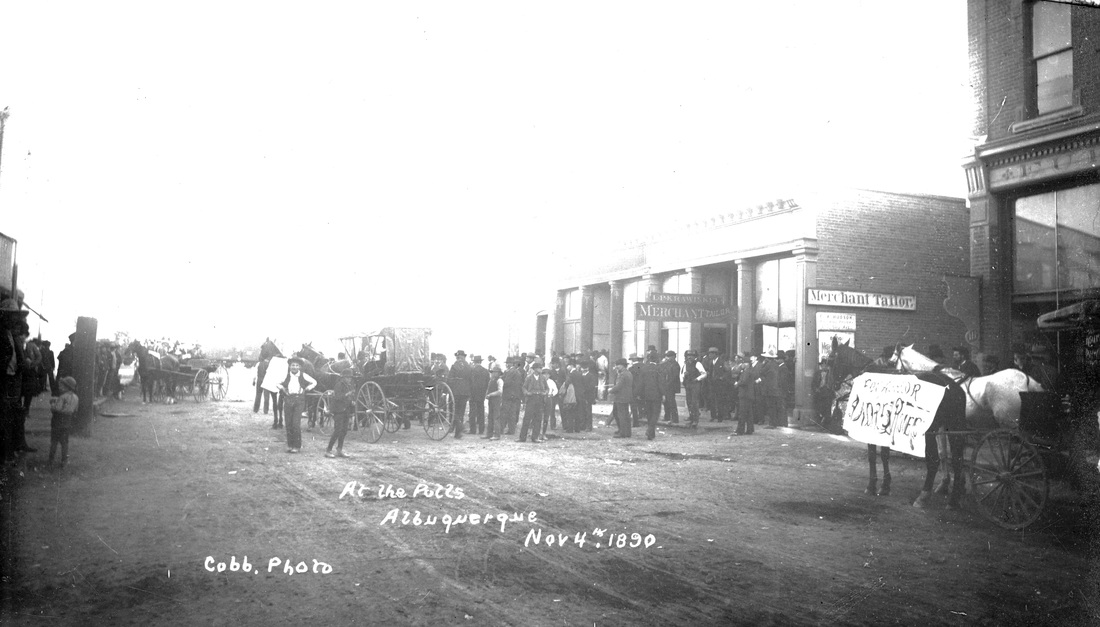Albuquerque's First Town Elections
Albuquerque’s first municipal election was wonderfully described in an Albuquerque Journal article dated April 14, 1935 entitled “Journal Files Reveal History of Incorporation of Town 50 Years Ago: Growth of New City.” This description is provided below:
“While it is generally agreed that the first white man to visit Albuquerque, then an Indian territory, were Europeans in 1540, almost 400 years ago, it was not until July 1885, that its citizens went to the polls to vote for their favorite candidate in the first municipal election the town ever held.
Until several years after the coming of the railroad in 1880, nearly everyone lived in Old Albuquerque and rode in to the new town for business on the mule car, a street car lined owned by Oliver E. Cromwell, noted New York capitalist, then a resident here for his health.
But, at the time of incorporation, a census showed that there were 3,054 people living within the confines of the new town, and Bernalillo County, then twice its present size, boasted 4,560 poll tax receipts.
Great excitement prevailed in Albuquerque on July 1, 1885. Two tickets were to be voted on – the “people’s” ticket and the “democratic” ticket, with the first victorious by almost two in one. There were two polling places – the north and south end of the city, with Central Avenue as the dividing line."
Note: Albuquerque was an incorporated town until 1891 when it incorporated as a City under territorial law.
“While it is generally agreed that the first white man to visit Albuquerque, then an Indian territory, were Europeans in 1540, almost 400 years ago, it was not until July 1885, that its citizens went to the polls to vote for their favorite candidate in the first municipal election the town ever held.
Until several years after the coming of the railroad in 1880, nearly everyone lived in Old Albuquerque and rode in to the new town for business on the mule car, a street car lined owned by Oliver E. Cromwell, noted New York capitalist, then a resident here for his health.
But, at the time of incorporation, a census showed that there were 3,054 people living within the confines of the new town, and Bernalillo County, then twice its present size, boasted 4,560 poll tax receipts.
Great excitement prevailed in Albuquerque on July 1, 1885. Two tickets were to be voted on – the “people’s” ticket and the “democratic” ticket, with the first victorious by almost two in one. There were two polling places – the north and south end of the city, with Central Avenue as the dividing line."
Note: Albuquerque was an incorporated town until 1891 when it incorporated as a City under territorial law.
Defeated candidates were: John A. Lee, Edward Strassburg, C.W. Kennedy, J.C. Marshall, Thomas Keleher, Lawrence Marriman and W.E. Talbott. Of these, the Morning Journal on July 1, 1885, said: “Let not the defeated candidates be cast down. Their defeat brought no discredit to them and they stand as high in the esteem of the people, as ever.”
Editor and owner of the Morning Journal at that time, and also postmaster, was Thomas Hughes, father of Thomas Hughes. Editorially the day following the election, Hughes said: “Yesterday was a great day for Albuquerque – the greatest in its history in some respects. It was the occasion of the first election ever held here for municipal
affairs.
“A very heavy vote was polled and the workers on each side were as busy as bees and perspired like horses. No city ever demonstrated a better right to self-government by virtue of the intelligence and orderly character of its people.
“The antagonisms were intense and the feeling was very bitter at times, but not a single disturbance of any consequence occurred during the day.”
The editor went on to say that the sheriff, Santiago Baca, had ordered all saloons closed and that “Mr. Hurley, the ice cream man, has an eye to business. He put up a lemonade stand in front of his establishment and did a land-office business.” He also noted that “a few Republicans voted the “people’s ticket.”
